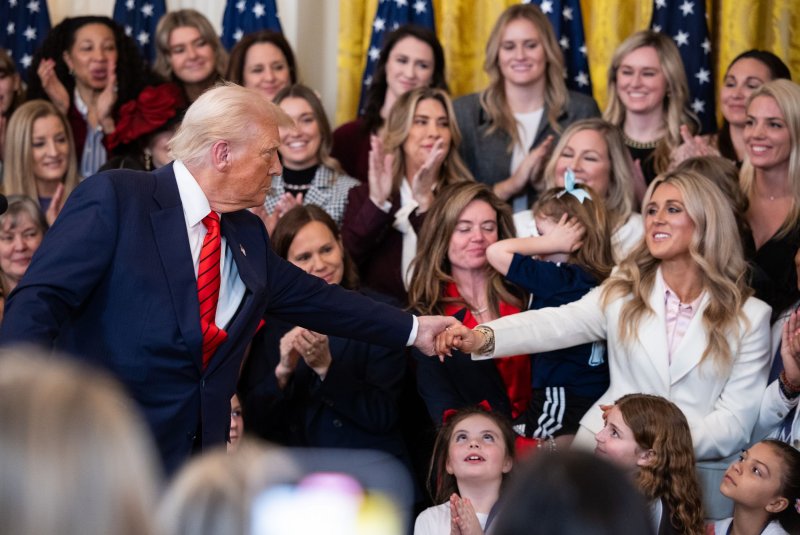Feb. 5 (UPI) — President Donald Trump signed an executive order Wednesday banning transgender women from competing in women’s sports.
“From now on, women’s sports will be only for women,” he said of the decree called the “No Men In Women’s Sports Executive Order” during a ceremony with athletes in the East Room of the White House.
“Now, you’re going to go out and win those events,” Trump said as he handed out the pens to young athletes.
The ceremony included Riley Gaines, a swimmer at the University of Kentucky, who has campaigned with Trump against the participation of trans women in women’s sports.
Trump followed through on his campaign promise to sign an order though a relatively small number of transgender people compete in sports.
The order is intended to reverse the policy of the Biden administration, which considered banning transgender athletes a violation of Title IX federal law. The law prohibits sex discrimination at educational institutions that receive federal funds.
Trump warned schools that don’t comply with the new order will be “investigated for violations of Title IX” and could lose federal funding.
Trump also said that he has instructed Secretary of State Marco Rubio to “make clear to the International Olympic Committees … that America categorically rejects transgender lunacy.”
In 2023, the U.S. House approved a bill that proposed an amendment to Title IX, restricting transgender athletes from competing in girls and women’s sports at federally funded educational institutions. But it didn’t pass in the Senate.
The executive order views transgender athletic participation as denying “women single-sex sports and single-sex locker rooms.”
The executive order doesn’t ban transgender men from competing in men’s sports.
Transgender opponents, proponents
Human Rights Campaign, the largest LGBTQ advocacy organization in the United States, has opposed Trump’s action, saying, “While this order will target transgender youth specifically, blanket bans have negative impacts on all girls.”
The organization president, Kelley Robinson, said in a statement, “This order could expose young people to harassment and discrimination, emboldening people to question the gender of kids who don’t fit a narrow view of how they’re supposed to dress or look.
“And it comes at a time when the Trump administration continues to distract and divide the country, handing the keys to the federal government to unelected billionaires and refusing to address urgent issues that the country is facing.”
May Mailman, deputy assistant to the president and senior policy strategist, told ABC News that the administration is protecting women’s sports.
According to a 2023 Gallup poll, 70% of Americans responding to the poll said trans athletes should only be allowed on sports teams in line with birth gender.
Rep. Nancy Mace, R-S.C., said she opposes transgender athlete rights under Title IX.
“No amount of activism, corporate pressure, or lies can erase reality-men are biologically different from women,” Mace said on X.
She said the executive order “restores fairness, upholds Title IX’s original intent and defends the rights of female athletes.”
According to an October 2023 review of 2017 research published in the journal Sports Medicine, trans people appear to have no advantage in sports.
Last week, Trump signed an executive order to take away rights to gender-affirming care for people younger than 19.
Twenty-seven states already rules banning transgender students from participating in sports consistent with their gender identity, according to the Movement Advancement Project, an LGBTQ think tank.
Transgender statistics
About 1.3 million adults and 300,000 youth ages 13 to 17 identify as transgender out of 330 million people, according to a report published by Williams Institute, a think tank at UCLA’s Law School in 2022.
Fewer than 40 of the NCAA’s more than 500,000 athletes are known to be transgender, Anna Baeth, director of research at Athlete Ally, an organization that advocates for LGBTQ equality in sports.
Transgender athletes are allowed to compete in the Olympics if they meet the eligibility criteria set by their sport’s International Federation.
Nikki Hiltz, an American transgender and non-binary runner, qualified for the 2024 Paris Games.
Transgender swimmer Lia Thomas, 25, was not be allowed to compete for a spot on the U.S. team in the 2024 Paris Olympics after the Court of Arbitration for Sport dismissed a challenge to policy that bans transgender athletes from competing in women’s races.
In 2024, Thomas won the NCAA individual title in the women’s 500-yard freestyle event with Penn. She was the first openly transgender athlete to win an NCAA Division I event.
Thomas, who originally competed on the men’s team, began transitioning and using hormone replacement therapy.
Harvard swimmer Schuyler Bailar made history in 2015 as the first openly transgender athlete to compete on a Division 1 men’s team, called the order “absolutely devastating” and “discriminatory.”
